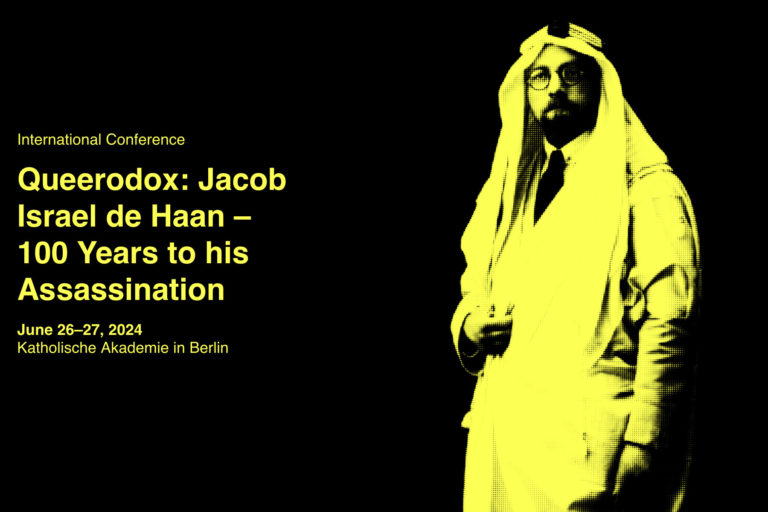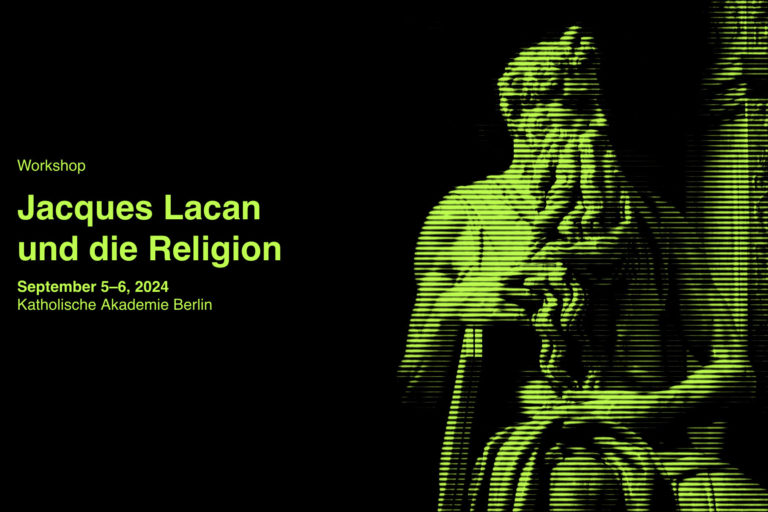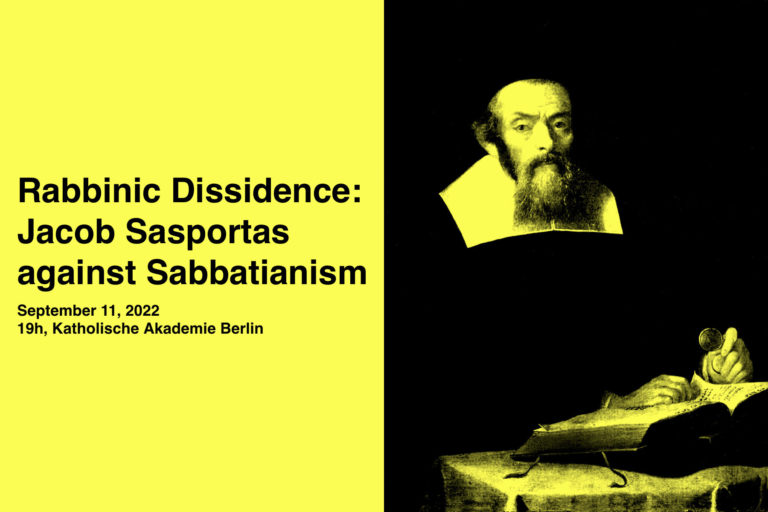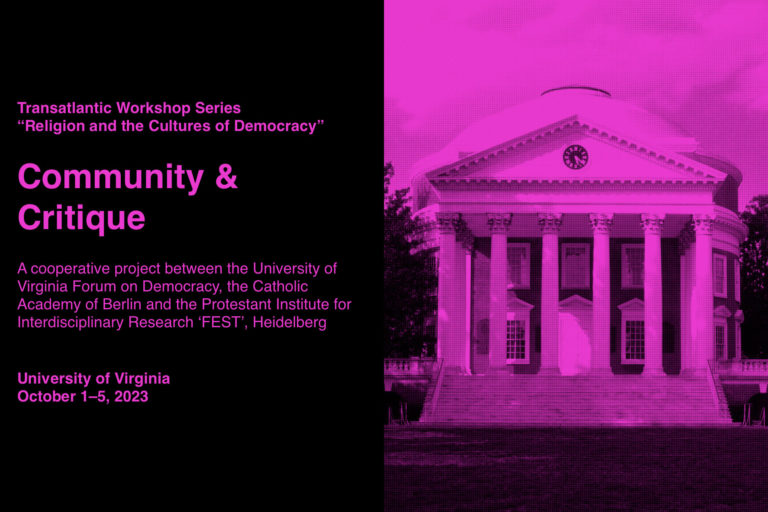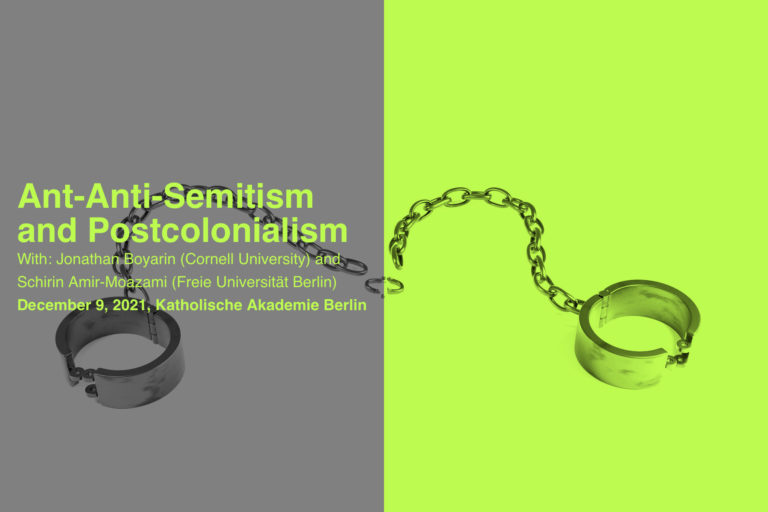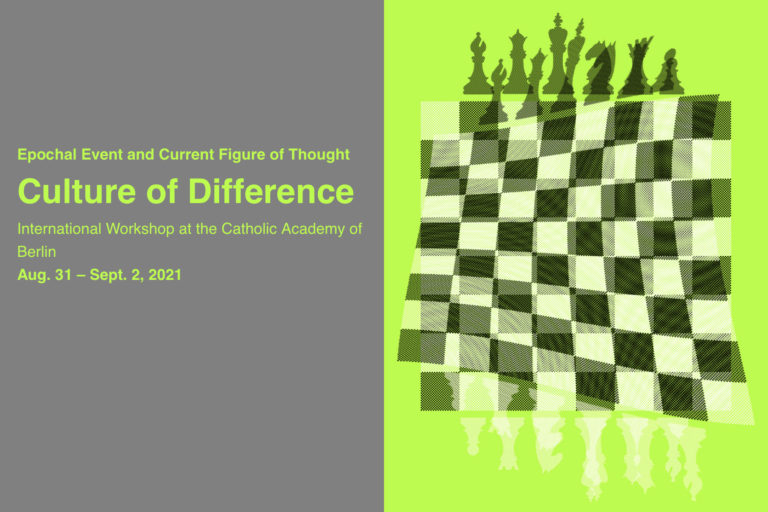Annual Network Meeting “Jewish and Catholic Intellectuality”
Political Theology, Now, Why?
Katholische Akademie in Berlin
October 25 – 27, 2021
Annual Network Meeting “Jewish and Catholic Intellectuality”
Recent decades have seen a renewal of interest in political theology, in the broadest sense of the interrelations between socio-cultural understanding and performance, on the one hand, of the political, and on the other hand, of the religious. This theo-political renaissance has developed, among others, in temporal and discursive correlation to events such as the collapse of communism culminating in 1989 and the emergence of the “clash of civilization” discourse, in particular after 9/11.
The rise of post-secular awareness too has generated, within the self-reflection of Western modernity, a self-critique of secularism, which seeks to revisit the relations of modernity to various religious – or so-called religious – traditions and cultures, premodern, modern and postmodern. One of the basic theo-political question guiding this intellectual process has been the extent to which secularism, which considered itself as effecting a decisive break between politics and religion, nonetheless has been enacting specific theo-political conceptions, and rather than breaking with traditional debates altogether, has been a specific intervention within these debates.
In this process of critical reevaluation of modernity, Jewish and Catholic intellectual traditions have a specific role to play, since in many respects, and in different ways, both these traditions represent, vis-à-vis the constitutively modern Protestantism, constellations of pre-modern political theology. Coping with modernity for both traditions presented specific challenges, which on the one hand required still ongoing processes of self-reconfiguration and reinvention, and on the other hand singled out these two traditions as sites of modern self-reflection, self-critique and potentially renewal. As such, Jewish and Catholic discourses feature, in very different ways, affinities to a contemporary dispersion of sites that have the structural potential of generating intellectual critique.
The aim of the 2021 annual meeting is to bring together actors within various intellectual discourses, who engage in different ways on the contemporary rethinking of political theology, to establish an initial inter-discursive conversation. The goal of this initial conversation is to layout a basic map of different directions and strategies operative within contemporary debates around political theology, basic positions, goals and orientations, as well as central questions, themes, textual archives and argumentations.
The participants in the meeting will be invited to deliver talks referring to any aspect of the above set of issues. Talks should address the following main concerns:
(1) Political theology today: critical reflections on various ways of framing and articulating the fundamental theo-political question within contemporary operative discourses and formative debates, in theory and in politics, not the least concerning the aptitude of concepts such as “religion”, “secularism”’ or “political theology”. Other aspects pertain to such questions as the role of religious communities and organizations as well as the State vis-à-vis new socio-political processes such as globalization, economic inequality, the rise of illiberalism, migration or anti-racist and postcolonial concerns, and also in view of regional and interregional concerns in the Middle East, within Israel and in Europe.
(2) Traditions of political theology: various theories, notions, categories and texts within Jewish, Catholic, Islamic and other traditions of thought and politics, which have played a role in shaping historical or contemporary theo-political constellations, and that may shed light or provide inspiration and orientation for current conversations.
(3) Political theologies – future conversation: aspects pertaining to political theology as a topos and space of conversation and debate between different intellectual traditions, cultures, religions and historical discourses. Contributions may address Jewish-Catholic relations and also the relations with and to other intellectual traditions, such as other Christian traditions, Islam, African, Asian or Southern cultures.
Participants
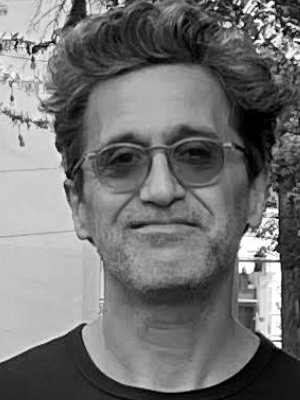
Gil Anidjar teaches in the Department of Religion and the Department of Middle Eastern, South Asian, and African Studies at Columbia University. His main contributions to the political theology debates are found in The Jew, the Arab: A History of the Enemy (Stanford UP, 2003) and in Blood: A Critique of Christianity (Columbia UP, 2014).
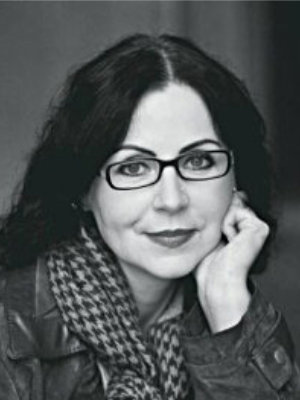
Agata Bielik-Robson is a Professor of Jewish Studies at the University of Nottingham and a Professor of Philosophy at the Polish Academy of Sciences. She published articles in Polish, English, German, French and Russian on philosophical aspects of psychoanalysis, romantic subjectivity, and the philosophy of religion (especially Judaism and its crossings with modern philosophical thought).
Her publications include books: The Saving Lie. Harold Bloom and Deconstruction (Northwestern University Press, May 2011), Judaism in Contemporary Thought. Traces and Influence (coedited with Adam Lipszyc, Routledge 2014), Philosophical Marranos. Jewish Cryptotheologies of Late Modernity (Routledge 2014) and Another Finitude: Messianic Vitalism and Philosophy (Bloomsbury, 2019).
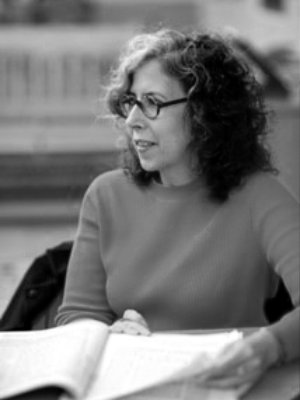
Julie E. Cooper is Senior Lecturer (US equivalent: Associate Professor) in the Political Science Department at Tel Aviv University. Her research interests include the history of political theory; early modern political theory (especially Hobbes and Spinoza); secularism and secularization; Jewish political thought; and modern Jewish thought.
She is the author of Secular Powers: Humility in Modern Political Thought (Chicago, 2013). Her work has appeared or is forthcoming in journals including Review of Politics, The Historical Journal, Political Theory, Jewish Quarterly Review, Annual Review of Political Science, the Journal of Politics, and Political Theology. She has been awarded fellowships from the School of Social Science, Institute for Advanced Study and The Herbert D. Katz Center for Advanced Judaic Studies. She is currently working on a book project, tentatively entitled Politics Without Sovereignty? Exile, State, and Territory in Jewish Thought, that examines modern attempts to reimagine and rehabilitate Judaism’s national and political dimensions.
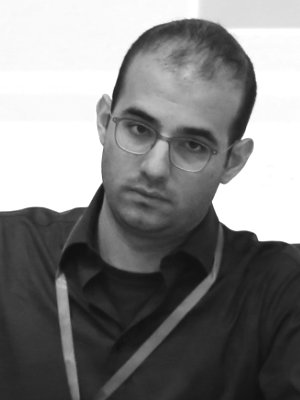
Azar Dakwar is PhD candidate in political and social thought at Brussels School of International Studies, University of Kent, where he is completing a dissertation titled Thinking the Muslim Question by way of Rethinking the Jewish Question: A Critique of Frankfurt School’s Secular Analytics of Religion.
In addition to the politics of Palestine/Israel, his scholarly interests revolve around the modern question and category of religion and the problematics of domination, emancipation and progress in critical theory, political theology and political economy. His work appeared and forthcoming, among others, in Critical Horizons, Theory & Event, Contemporary Political Theory, European Law Journal, Journal of Palestine Studies [Arabic] and Theory and Criticism [Hebrew]. He is co-Editor of Rethinking the Politics of Israel/Palestine: Partition and Its Alternatives (2014, with Bashir Bashir) and Israel and the Apartheid: A Comparative Study (2018, with Honaida Ghanim) [Arabic].
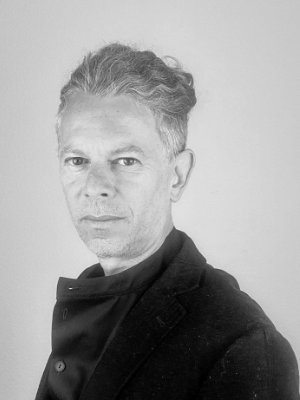
Luca Di Blasi is Associate Professor of Philosophy at the Theological Faculty of the University of Bern and Associate Member of the ICI Berlin. He is currently leading the project “Disagreement Between Religions. Epistemology of Religious Conflicts”. His theoretical main interests include philosophy of religion, modern continental philosophy, and political theology.
Main publications: Dezentrierungen. Beiträge zur Religion der Philosophie im 20. Jahrhundert (Vienna: Turia+Kant, 2018); Der weiße Mann. Ein Anti-Manifest (Bielefeld: transcript, 2013); Der Geist in der Revolte. Der Gnostizismus und seine Wiederkehr in der Postmoderne (Munich: Fink, 2002).
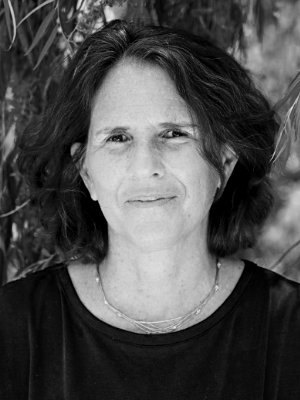
Yochi Fischer is a Historian, she is the Deputy Director of the Van Leer Jerusalem; the academic Director of the Sacredness, Religion, and Secularization Cluster; the Director of the Intellectual Journeys project at the Van leer Jerusalem Institute. Her research interests include religion, secularization, and secularism in historical and comparative perspectives; contemporary historical methodology; memory and history, and the connection between research and creativity.
Among her publications: Editor, Secularization and Secularism: Interdisciplinary Perspectives (Van Leer Jerusalem Institute and Hakibbutz Hameuchad, 2015, in Hebrew); “The Concepts of “Religion” and “Secularism” in the Hebrew Language and their Manifestations in L.Hölscher and M.Eggert (eds.), Transformation and Transfers of Religious Discourses in Religion and Secularity, Leiden: Brill, 2013; Y. Fischer and Z.Maor (eds), Nationalism and Secularization, Magnes Press and the Van Leer Institute Press and , Jerusalem, 2019; ” What Does Exile Look Like? Transformations in the Linkage between the Shoah and the Nakba” in The Holocaust and the Nakba: A New Grammar of Trauma and History, Edited by Bashir Bashir and Amos Goldberg (Columbia UP, 2018)
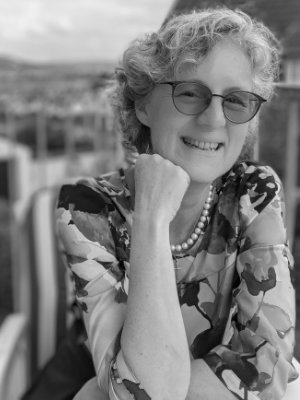
Margareta Gruber OSF, Professorin für Neues Testament und Biblische Theologie, Katholische Fakultät der Philosophisch-Theologischen Hochschule Vallendar/Koblenz. Von 2009-2013 Inhaberin des Laurentius-Klein-Lehrstuhls für Biblische und Ökumenische Theologie an der Abtei Dormitio Mariae in Jerusalem.
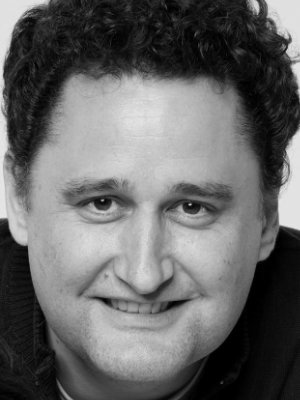
Oliver Hidalgo is professor for political science and researcher at the universities in Muenster and Regensburg on issues related to political theory and the history of ideas, democratic theory, and the relationship between politics and religion. He is the spokesman for the Standing Group on Politics and Religion of the German Political Science Association (DVPW).
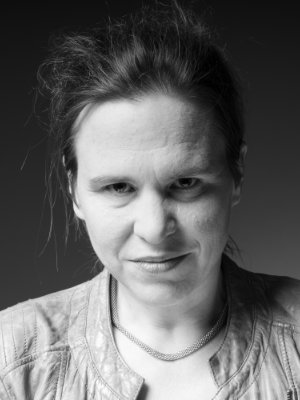
Sandra Lehmann is a Postdoc at the Department of Intercultural Philosophy of Religion, Faculty of Catholic Theology, University of Vienna. After several research and teaching visits at universities in Austria (Vienna, Linz), the Czech Republic (Prague, Olomouc), Israel (Jerusalem), and Spain (Seville), she was a deputy professor in Perception Theory at Hochschule für Gestaltung Offenbach in 2019. Additionally, in 2019-2020, she was a visiting professor at the Institute of Philosophy at the University of Kassel.
Publications: “Early Christian Martyrdom and the End of the Ur-Arché,” Journal for Continental Philosophy of Religion 1 (2019), 213-231; Die metaphysische Bewegung. Das Verhältnis von Philosophie und Politik, Vienna: Turia + Kant 2014; Wirklichkeitsglaube und Überschreitung. Entwurf einer Metaphysik, Vienna: Turia + Kant 2011.
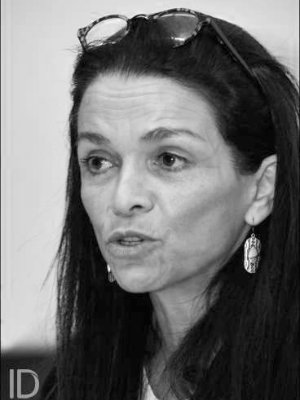
Vivian Liska is Professor of German literature and Director of the Institute of Jewish Studies at the University of Antwerp, Belgium. She is also, since 2013, Distinguished Visiting Professor in the Faculty of the Humanities at The Hebrew University of Jerusalem. Her research focuses on literary theory, German modernism, and German-Jewish authors and thinkers.
She is the editor of the book series “Perspectives on Jewish Texts and Contexts” (De Gruyter, Berlin), co-editor of the Yearbook of the Society for European-Jewish Literature, and Arcadia. International Journal of Literary Studies. Her recent book publications include Giorgio Agambens leerer Messianismus; When Kafka Says We. Uncommon Communities in German-Jewish Literature and German-Jewish Thought and its Afterlife. A Tenuous Legacy.
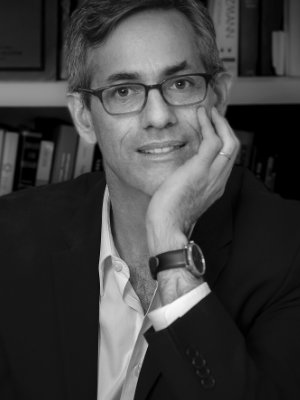
David N. Myers is the Sady and Ludwig Kahn Professor of Jewish History at UCLA, where he serves as the director of the UCLA Luskin Center for History and Policy. He is the author or editor of more than fifteen books in the field of Jewish history, including the forthcoming American Shtetl: The Making of Kiryas Joel, a Hasidic Village in Upstate New York (Princeton) with Nomi Stolzenberg. Myers also serves as President of the New Israel Fund.
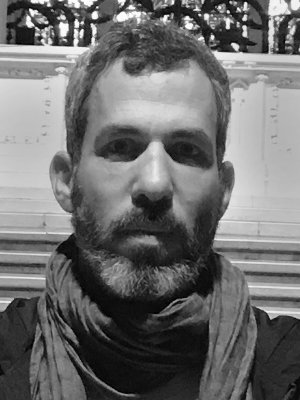
Ron Naiweld is a historian of Judaism at the CNRS and the EHSS in Paris, France. He currently studies the biblical myth and its manifestations in late medieval and early modern Jewish and Christian societies.
Among his recent publications: Histoire de Yhavé. La fabrique d’un mythe occidental (Fayard, 2019); The Age of the Parákletos. A Historical Defense of Rabbinic Knowledge (Rowman and Littlefield, 2022)
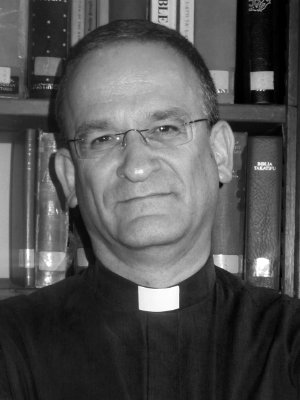
David Mark Neuhaus SJ is superior of the Jesuit community in the Holy Land. He teaches Scripture in various institutions in Israel and Palestine. He completed a BA, MA and PhD (Political Science) at Hebrew University, Jerusalem. He then completed pontifical degrees in theology and Scripture in Paris (Centre Sevres) and Rome (Pontifical Biblical Institute). He is emeritus Latin Patriarchal Vicar for Hebrew Speaking Catholics in Israel and Coordinator of the Pastoral among Migrants and Asylum Seekers in Israel.
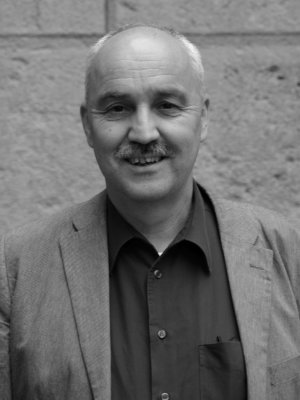
Wolfgang Palaver is Professor of Catholic Social Thought at the University of Innsbruck, Austria. He has published books and articles on political theology, violence and religion, Thomas Hobbes, Carl Schmitt, Simone Weil, and René Girard.
His most recent English book is Transforming the Sacred into Saintliness (Cambridge University Press, 2020). Previously he published René Girard’s Mimetic Theory (Michigan State University Press, 2013). He is the co-editor of Politische Philosophie versus Politische Theologie? (Innsbruck University Press, 2011). In fall 2018, he was a member of the research workshop on religion & violence at the Center of Theological Inquiry (CTI) in Princeton (USA). From January until June 2021, he conducted a research project on Gandhi’s concept of nonviolence at The Stellenbosch Institute for Advanced Study (South Africa).
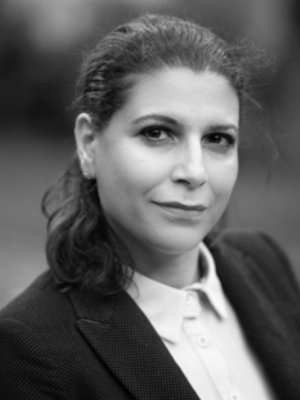
Nahed Samour is Post Doc researcher at the Integrative Research Institute Law & Society, Faculty of Law, Humboldt Universität zu Berlin. She has studied law and Islamic studies at the universities of Bonn, Birzeit/Ramallah, London (SOAS), Berlin (HU), Harvard and Damascus. She was a doctoral fellow at the Max Planck Institute for European Legal History in Frankfurt/Main.
Samour clerked at the Court of Appeals in Berlin, and held a Post Doc position at the Eric Castrén Institute of International Law and Human Rights, Helsinki University, Finland and was Early Career Fellow at the Lichtenberg-Kolleg, Göttingen Institute for Advance Study. She has taught as Junior Faculty at Harvard Law School Institute for Global Law and Policy from 2014-2018. Her work focuses on law and religion.
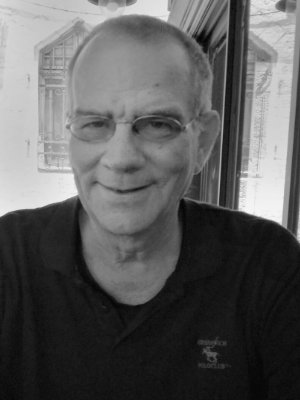
Christoph Schmidt is Professor at the departments of Philosophy, Comparative Religion and German Literature at the Hebrew University.He is seniour research fellow at the Van Leer institute in Jerusalem. He has published numerous books and essays on modern political theology in the Secular, Christian (protestant, catholic) and the Jewish context.
His latest book deals with the political theologies of the 68 students’ movement and its relation to Auschwitz. Forthcoming in 2022 is a collection of essays on the occasion of hundred years of political theology. Schmidt is presently working on a book on “The two Bodies of the Subject – Between Marx and Kierkegaard”.
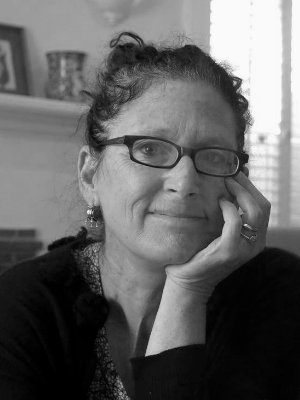
Nomi M. Stolzenberg is a legal scholar who holds the Nathan and Lilly Shapell Chair in Law at the Gould School of Law at the University of Southern California. Her research spans a range of interdisciplinary interests, including law and religion, law and liberalism, law and feminism, law and psychoanalysis, and law and literature. A strong proponent of multidisciplinary research and teaching, she helped establish the USC Center for Law, History and Culture, one of the preeminent centers for the study of law and the humanities.
She has written several articles and book chapters on political theology, including “From Eternity to Here: Divine Accommodation and the Lost Language of Law,” in The Oxford Handbook of Law and Humanities (Simon Stern, Maksymilian Del Mar, and Bernadette Meyler, eds., 2019); Political Theology With a Difference, 4 U.C. Irvine Law Review 407 (2014); and “The Profanity of Law,” in Law and the Sacred (Austin Sarat, Lawrence Douglas & Martha Merrill Umphrey, eds., Stanford U. Press, 2007). She has also written widely on the subject of law and religion, including works such as “The Return of Religion: The Rise, Decline, and Possible Resurrection of Legal Secularism,” “Is There Such a Thing as Non-State Law? Lessons from Kiryas Joel,” and “It’s About Money: The Fundamental Contradiction of Hobby Lobby,” 88 Southern California Law Review 727 (2015). She is currently working on developing a legal theory of “faith-based discrimination.” Her book, American Shtetl: The Making of Kiryas Joel, a Hasidic Village in Upstate New York, co-authored with David N. Myers, will be published by Princeton University Press this January.
Program
Day 1 – October 25 – Monday
| 17:30-18:30 | Dinner and Get-together |
|---|---|
| 18:30 | Greetings, Opening Remarks |
| Evening Event: Political Theology and Secular Thought | |
| 19:00 | Vivian Liska (University of Antwerp): Abraham’s Agency: Arendt, Kafka and Human Rights Oliver Hidalgo (University of Munster): Political Theology and the Secular: Two Sides of the Same Coin? |
Day 2 – October 26 – Tuesday
| Theo-Politics of Palestine | |
|---|---|
| 10:00-11:30 | Gil Anidjar (Columbia University): Negative Political Theology (On Palestine) David Neuhaus (Pontifical Biblical Institute – Jerusalem, Society of Jesus): Jewish-Christian Dialogue and Palestine |
| 11:30-12:00 | Coffee Break |
| Contemporary Visions | |
|---|---|
| 12:00-13:30 | Agata-Bielik Robson (University of Nottingham): The Theopolitics of the Apocalypse: Hegel, Rosenzweig, Derrida Luca Di Blasi (University of Bern): Political Theology of Guilt |
| 13:30-15:30 | Lunch Break |
| Round table: Modern Theopolitics in Christianity, Islam and Judaism | |
|---|---|
| 15:30-17:30 | Margareta Gruber (Philosophisch-Theologische Hochschule Vallendar): Urban living spaces for all peoples. The Vision of the New Jerusalem in the Book of Revelation. Julie Cooper (Tel Aviv University): Is “Political Theology” a Relevant Category for the Study of Jewish thought? Anoush Ganjipour (University of Bern): Modernity and specters of the divine law: the case of Sharia |
| 18:00-19:00 | Dinner |
| Evening Event: Theopolitics and Law – European and American Perspectives | |
|---|---|
| 19:00 | Nahed Samour (Humboldt University Berlin): Political Theology and Stigma in the German Rechtsstaat David Myers (UCLA)/ Nomi Stolzenberg (USC): Kiryas Joel – New York Theocracy? |
Day 3 – October 27 – Wednesday
| Political Theology: Modern Traditions | |
|---|---|
| 09:30-10:30 | Christoph Schmidt (Hebrew University of Jerusalem): Feuerbach and Stirner: The Godman and the two bodies of the subject |
| 10:30-11:00 | Coffee Break |
| 11:00-12:30 | Sandra Lehman (University of Vienna): The Religious Question of Politics. Liberalism, Totalitarianism, and Mystical Politics According to Simone Weil Ron Naiweld (CNRS/EHESS): Political Theology to the People. The Popular Voice of the Bible (and how it is Silenced by Modern Biblical Scholarship) |
| 12:30-14:00 | Lunch Break |
| Round table: Political Theology in the Post-Secular Age | |
|---|---|
| 14:00-16:00 | Wolfgang Palaver (University of Innsbruck): Political Theology in the Light of Gandhi’s View of Religion and Politics Azar Dakwar (University of Kent): The Non-Question of Palestine: On Habermas’s Judeo-Christian, Post-National and Post-Secular Turns Yochi Fischer (Van Leer Institute Jerusalem): Theo-Political Challenges of Contemporary Israeli Secularism |



